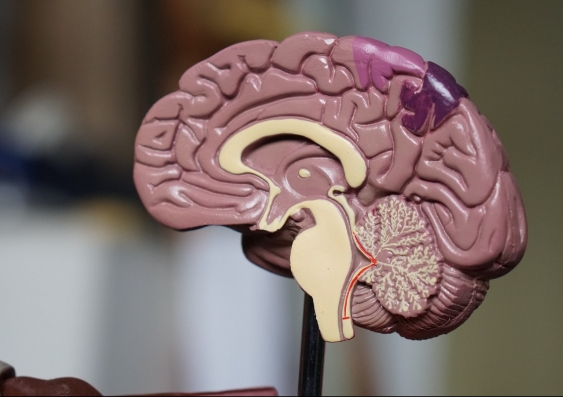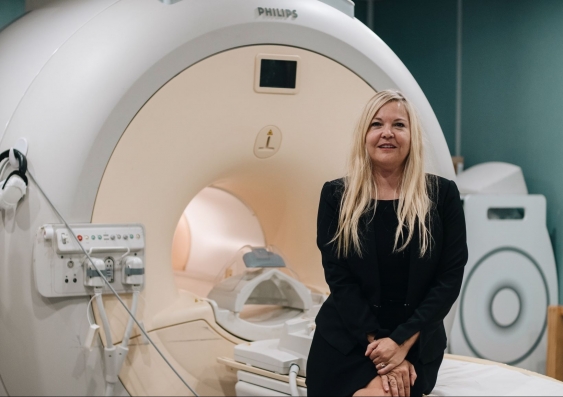Chronic pain might impact how the brain processes emotions
Chemical βmessengersβ called neurotransmitters help regulate our emotions β but scientists have noticed a disruption to their levels in people with chronic pain.
Chemical βmessengersβ called neurotransmitters help regulate our emotions β but scientists have noticed a disruption to their levels in people with chronic pain.

More than three million Australians experience chronic pain: an ongoing and often debilitating condition that can last from months to years. This persistent pain can impact many parts of a personβs life, with almost half of people with chronic pain also experiencing major anxiety and depression disorders.
Now, a new study led by ΡΗΓΐΖεΕΖ and NeuRA shows that people with chronic pain have an imbalance of neurotransmitters in the part of the brain responsible for regulating emotions.
This imbalance could be making it harder for them to keep negative emotions in check β and the researchers think persistent pain might be triggering the chemical disruption.
The findings are published today in the .
βChronic pain is more than an awful sensation,β says senior author of the study Associate Professor , a neuroscientist and psychologist at ΡΗΓΐΖεΕΖ and NeuRA. βIt can affect our feelings, beliefs and the way we are.Μύ
βWe have discovered, for the first time, that ongoing pain is associated with a decrease in GABA, an inhibitive neurotransmitter in the medial prefrontal cortex. In other words, there's an actual pathological change going on.β
Neurotransmitters help communicate and balance messages between cells. While some amplify signals (called excitatory neurotransmitters), others weaken them (inhibitive neurotransmitters).Μύ
GABA, or Ξ³-aminobutyric acid, is the main inhibitory neurotransmitter in the central nervous system. Its role in the medialΜύprefrontal cortex β the part of the brain where emotional regulation happens β is to help dial down our emotions.
βWhen thereβs a decrease in this neurotransmitter, our actions, emotions and thoughts get amplified.β
The research team used advanced neurological imaging to scan GABA content in the medial prefrontal cortex of 48 study participants, half of which experienced some form of chronic pain. A/Prof. Gustin says this relatively small sample size is typical for neurological imaging studies, which are costly to run.Μύ
The results show that participants with chronic pain had significantly lower levels of GABA than the control group β a pattern that was consistent regardless of their type of chronic pain.Μύ
βA decrease in GABA means that the brain cells can no longer communicate to each other properly,β says A/Prof. Gustin.Μύ
βWhen thereβs a decrease in this neurotransmitter, our actions, emotions and thoughts get amplified.β
While the link between chronic pain and decreased levels of GABA has previously been found in animal studies, this is the first time itβs been translated to human studies.Μύ
A/Prof. Gustin says she hopes the findings are encouraging for people with chronic pain who may be experiencing mental health issues.Μύ
βIt's important to remember itβs not you β thereβs actually something physically happening to your brain,β she says.Μύ
βWe don't know why it happens yet, but we are working on finding solutions on how to change it.β

This is the first time a link between chronic pain and decreased levels of GABA content have been found in human studies. Photo: Unsplash.
GABA is one of many neurotransmitters in the medialΜύprefrontal cortex β and itβs not the only one behaving differently in people with pain.Μύ
In a , A/Prof. Gustin and her team found that levels of glutamate, the main excitatory neurotransmitter in the central nervous system, are also lower than average in people with chronic pain. These low glutamate levels were linked to increased feelings of fear, worry and negative thinking.
βTogether, our studies show there's really a disruption in how the brain cells are talking to each other,β says A/Prof. Gustin, who has been researching chronic pain for over 20 years.
βAs a result of this disruption, a personβs ability to feel positive emotions, such as happiness, motivation and confidence may be taken away β and they canβt easily be restored.βΜύ
A/Prof. Gustin says chronic pain is likely to be the culprit behind these neurological changes. However, this theory could only be tested by scanning participantsβ brains both before and after they develop chronic pain β and as brain imaging is expensive to conduct, itβs unlikely such a large-scale project would be possible without major funding.
βEverything starts with stress,β she says. βWhen someone is in pain, it increases stress hormones like cortisol, which can trigger massive increases in glutamate. This happens during the initial, acute stage of pain.Μύ
βToo much glutamate can be toxic to brain cells and brain function. We think this disruption to normal brain function may cause the GABA and glutamate levels to change β and impair a personβs ability to regulate their emotions.βΜύ

A/Prof. Gustin, who has been researching chronic pain for over 20 years, is developing a non-pharmaceutical program to help people with chronic pain self-regulate their emotions. Photo: Supplied.
Medication is often used to help treat chronic pain, but there are currently no drugs that directly target the GABA and glutamate content in the medial prefrontal cortex. Instead, medication affects the entire central nervous system, and may come with side effects.Μύ
A/Prof. Gustin and her team have recently developed an online emotional recovery program, specifically targeted at people with chronic pain, as a non-pharmaceutical option for treating the neurotransmitter disruption.Μύ
The findings will be presented in a paper later this year, but the initial results are encouraging.ΜύΜύ
βThe online therapy program teaches people skills to help self-regulate their negative emotions,β says A/Prof. Gustin, who welcomes people interested in learning more about the program to contact the team.
βThe brain can't dampen down these feelings on its own, but it is plastic β and we can learn to change it.β
To learn more about the online emotional recovery program, please email A/Prof. Gustin at neurorecoveryresearch@unsw.edu.auΜύ
If this article has raised issues for you, or if youβre concerned about someone you know, you can find support through on 13 11 14 or on 1300 224 636.